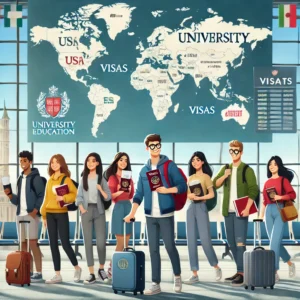Education Visa: Your Gateway to Studying Abroad
An education visa is a legal document that allows individuals to study in a foreign country for a specified period. Whether you’re pursuing an undergraduate, postgraduate, vocational, or specialized course, an education visa is essential for international students. This visa is typically issued based on admission to a recognized educational institution and proof of financial ability to sustain yourself during your studies.
Types of Education Visas
Different countries have various types of education visas, but they generally fall into two categories:
- Short-Term Study Visa – For short courses, exchange programs, or language studies lasting a few months.
- Long-Term Study Visa – For full-time academic programs like bachelor’s, master’s, PhD, or vocational training.
Each country may have its own classification, such as:
- F-1 Visa (USA) – For academic studies at accredited institutions.
- Tier 4 Student Visa (UK) – For students pursuing degree courses.
- Student Visa (Canada) – For full-time studies at Designated Learning Institutions (DLIs).
- Subclass 500 (Australia) – For higher education, vocational training, or school education.
- Schengen Student Visa (Europe) – For studying in Schengen Zone countries.
General Requirements for an Education Visa
To apply for an education visa, you must meet specific eligibility criteria. The requirements may vary by country, but common prerequisites include:
1. Admission to a Recognized Institution
You must have an official acceptance letter from a government-recognized educational institution. This serves as proof that you have been enrolled in a legitimate academic program.
2. Proof of Financial Capability
Most countries require proof that you can financially support yourself during your studies. This can include:
- Bank statements
- Sponsorship letters
- Scholarships or grants
- Tuition fee receipts
3. Valid Passport
Your passport should be valid for the duration of your studies and beyond. Some countries require at least six months of validity from the expected date of departure.
4. Visa Application Form and Fees
A completed visa application form along with the required visa fee must be submitted. Fees vary depending on the country and visa type.
5. Proof of English or Local Language Proficiency
For English-speaking countries, tests like IELTS, TOEFL, or PTE are commonly required. Non-English-speaking countries may require language proficiency tests specific to their language.
6. Medical Examination & Health Insurance
Many countries mandate a medical check-up to ensure you are fit for travel and study. Health insurance may also be required to cover medical expenses during your stay.
7. Police Clearance Certificate
Some countries require a police clearance certificate to prove that you have no criminal record.
8. Visa Interview (if applicable)
Certain countries, such as the USA, require students to attend a visa interview at the consulate or embassy.
 Education Visa Application Process
Education Visa Application Process
The process for obtaining an education visa usually follows these steps:
Step 1: Secure Admission to a Recognized Institution
- Apply to universities or colleges.
- Receive a confirmation letter or Certificate of Enrollment.
Step 2: Gather Required Documents
- Passport
- Visa application form
- Acceptance letter from the institution
- Financial proof
- Language proficiency test results
- Health and police clearance certificates (if required)
Step 3: Apply for the Visa
- Submit your application online or at the respective country’s embassy/consulate.
- Pay the required visa processing fee.
Step 4: Attend a Visa Interview (if required)
- Some countries require an interview to assess your study intentions and financial capacity.
Step 5: Visa Approval & Travel Arrangements
- If your visa is approved, you can proceed with travel arrangements, including booking flights and securing accommodation.
Work Rights on an Education Visa
Many countries allow international students to work while studying, but conditions apply.
- USA: F-1 students can work up to 20 hours per week on campus during the academic session.
- Canada: Students can work up to 20 hours per week during school terms and full-time during holidays.
- Australia: Student visa holders can work 24 hours per week while classes are in session.
- UK: Tier 4 students can work up to 20 hours per week if studying at degree level or higher.
It is crucial to check the specific work conditions attached to your visa to avoid any violations.
Common Reasons for Education Visa Rejection
Visa applications can be denied due to several factors, including:
- Insufficient financial proof – Inability to demonstrate enough funds for tuition and living expenses.
- Incomplete or incorrect documentation – Missing paperwork or errors in the application.
- Poor visa interview performance – Failing to convincingly explain study intentions.
- Weak academic background – If your qualifications do not match the course requirements.
- Overstaying risk concerns – If the immigration officer believes you may not return after completing your studies.
To improve your chances of approval, ensure all documents are complete, be honest in your application, and prepare well for any interviews.
How We Can Help
Navigating the education visa process can be complex, but our expert consultants are here to assist you every step of the way. We offer:
✅ University & Course Selection Guidance
✅ Visa Documentation & Application Support
✅ Financial Proof & Sponsorship Guidance
✅ Visa Interview Preparation
✅ Post-Visa Support (Travel, Accommodation, and More)
Let us simplify your study-abroad journey! Contact us today to start your application. ✈️
We provide top consulting services
We provide expert guidance and hassle free solution for your visa and immigration needs. Your journey starts with us!.
